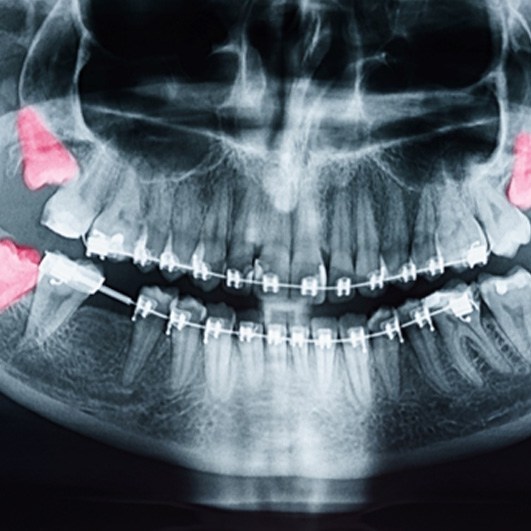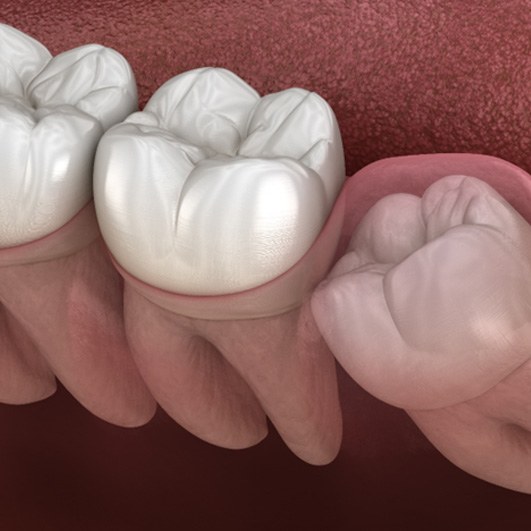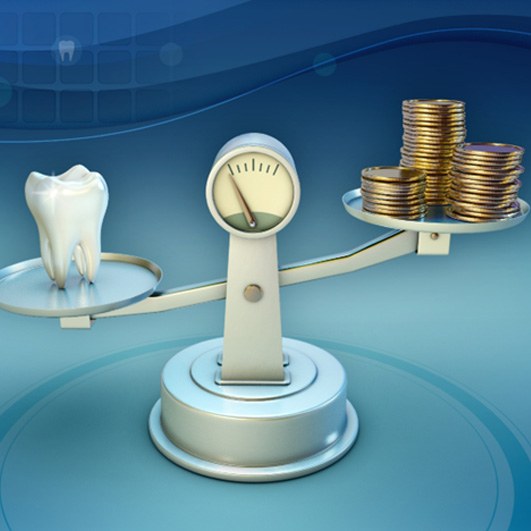
Wisdom Tooth Extractions – Barnegat, NJ
Protect Your Smile from Further Pain and Damage
Between the ages of 17 and 25, your wisdom teeth will try to erupt in your mouth. However, due to a lack of space, they may become partially or fully impacted, leading to constant pain and putting the rest of your smile at risk. Fortunately, Dr. Gizachew can remove your wisdom teeth before they can do any lasting harm to your mouth. Call today to schedule a consultation if you have concerns about your third molars.
Why Choose NU Dental of Barnegat for Wisdom Tooth Extractions?
- Same-Day Emergency Appointments Available
- Relaxing Options for Dental Sedation
- Convenient Evening and Saturday Hours
What Are Wisdom Teeth?

The wisdom teeth are also known as the third molars. They are the last set of teeth to erupt in your mouth, which is why there’s typically not enough room for them. Early humans may have needed wisdom teeth due to eating coarser foods. Nowadays, though, these extra teeth are no longer needed for your mouth to function properly, so if they become impacted, it’s best to remove them as soon as possible before they can cause problems.
Why Do Wisdom Teeth Need to Be Removed?

Not everyone needs to have their wisdom teeth extracted. If yours can fully erupt without damaging your other teeth, it should be okay to leave them where they are. However, an extraction will be required if your wisdom teeth cause any of these problems:
- Continuous pain and pressure near the back of your mouth.
- Changing the alignment of your bite.
- Raising your risk of oral infections.
What to Expect from the Wisdom Teeth Procedure

Your mouth will be numbed at the beginning of the procedure, and we can use sedation to keep you calm if necessary. Then, Dr. Gizachew can begin the removal process. If the teeth have partially erupted, he can use a special instrument to rock them back and forth, gently loosening them until they can be taken out. For impacted wisdom teeth, a surgical approach is needed. The gums will be opened to provide access to the teeth, and each molar may need to be divided into sections so that they can be removed without taking too much bone with them.
Recovering from Wisdom Teeth Extraction

Once the procedure is complete, we’ll give you instructions for recovery. Generally speaking, you’ll need to:
- Take any prescribed pain medications as directed.
- Apply a cold compress to the area for 20-minute intervals to alleviate the swelling.
- Consume a liquid and soft food diet that won’t put too much pressure on your mouth while it’s healing.
- Avoid strenuous activity for at least the first several days so as not to disrupt the healing process.
Understanding the Cost of Wisdom Tooth Extractions

Wisdom teeth may have been useful for our early ancestors, but today they can cause more harm than good. It is oftentimes best to have them extracted before they can cause issues. However, many patients worry about the cost of their procedure. We won’t be able to determine the exact cost of your extraction until we can examine your smile in person. Until then, here are some things for you to take into consideration.
Factors That Impact the Cost of Wisdom Tooth Extractions

The cost of wisdom tooth extractions can vary on several different factors. During your consultation, we will discuss them in detail. Here are the most prominent ones that will affect the cost of your treatment:
- Number of Teeth: Some people don’t develop all four of their wisdom teeth. In other cases, not all of them need to be extracted. We will carefully examine your smile to determine what the best course of action is for you.
- Impaction: If your wisdom teeth are impacted, the procedure becomes more complex to complete. This will ultimately increase the cost of your treatment.
- Sedation: Dental sedation can make treatment more comfortable and help those with dental anxiety. Opting for sedation incurs its own cost that should be considered.
Does Dental Insurance Cover Wisdom Tooth Extractions?

Most dental insurance providers will cover at least part of the cost of wisdom tooth extractions. However, this also depends on whether you’ve met your deductible or your maximum for the year. The best way to learn about your benefits is to contact your dental insurance provider directly. We can also help you understand what your plan covers. At NU Dental Brick, we are proud to be partnered with a number of insurance companies. If you need any help understanding your plan or have any questions, don’t hesitate to give us a call !
How to Make Wisdom Tooth Extractions Affordable

If you don’t have dental insurance, this doesn’t mean that you will be left completely on your own. With our Dental Membership Plan , you can save on treatments completed at our practice. We are also happy to accept payments through CareCredit – a third-party financing company that can split the cost of your treatment into manageable monthly installments with little to no interest. To learn more about your financial options, feel free to reach out to one of our friendly team members for assistance.
Wisdom Tooth Extractions FAQs
Why Do We Have Wisdom Teeth?
In our world today, wisdom teeth are considered a vestigial feature meaning that we no longer need them. It’s believed that our ancestors developed them as a necessity for survival. Early humans ate a diet that contained raw foods like meat, berries, nuts, roots, and leaves. Because they didn’t heat or cook them, they needed broader jaws and stronger molars to chew effectively. This could wear down, break, or dislodge their pearly whites by the time they reached adulthood, leaving them unable to consume nutrients. They didn’t have dentists to repair the damage, so new molars would grow in to supplement any that were damaged or lost.
Today, they’re not necessary because we cook, bake, cut, and prepare our foods so that they’re easier to eat. Plus, our team keeps your smile healthy, so additional teeth aren’t necessary like they once were. If you’re worried about the condition of your wisdom teeth, you’re welcome to contact us for a consultation.
What’s the Best Age to Get Wisdom Teeth Removed?
There’s no specific age limit for wisdom tooth extractions because they can be removed whether you’re a teenager or an adult. It’s worth noting, however, that it can be more difficult to pull them later in life because the roots will have grown longer and will be more embedded in the jawbone. This means older adults may have a harder time recovering after wisdom tooth extraction than teenagers. Many dentists recommend this procedure for high schoolers or college students because they can extract problematic teeth before they have a chance to cause any issues like impaction, tooth decay, cysts, or pushing their neighbors out of alignment. Plus, younger mouths heal more quickly.
Is Wisdom Tooth Removal Painful?
Many patients feel anxious when they learn they need a wisdom tooth extraction because they worry that it will be a long and agonizing procedure. Fortunately, Dr. Gizachew knows this and will do everything he can to help you feel calm throughout your appointment. First, he’ll start by applying a topical anesthetic so that you don’t experience discomfort. Then, he can provide one of several types of sedation so that your body is less able to register pain. While you might feel pressure, it won’t be outright hurtful. It’s normal to feel some aching and tenderness afterward, but our team will give you post-op instructions to minimize the risk of any complications.
How Do You Avoid Dry Socket After Wisdom Teeth Removal?
Dry socket is a painful condition that can occur after wisdom tooth extraction that happens when the blood clot that develops over the surgical site becomes dislodged. This exposes the underlying bone and nerves to food, bacteria, and air. Not only is this condition incredibly uncomfortable, but it also hinders your healing. You can prevent it by:
- Avoid drinking through straws.
- Don’t smoke vapes or cigarettes.
- Try not to chew hard foods on that side of your mouth.
- Keep away from rigorous activities that elevate your heart rate.
- Be careful not to use too much force when brushing your teeth.
Does Everyone Have Wisdom Teeth?
While most people get four wisdom teeth in their late teens or early 20s, some people are missing at least one or don’t have any at all. In rare cases, some people even have five or six! While nobody knows exactly why some people never get their third molars, genetics could be responsible. If your parent doesn’t have any or all of theirs, you may be missing at least one of yours, too.
That being said, just because you can’t see your wisdom teeth doesn’t mean you don’t have them at all. Dr. Gizachew can give you an accurate count of yours with the help of a dental X-ray.
Should Wisdom Teeth Be Removed Before Braces?
If you’re scheduled to receive braces, Dr. Gizachew may recommend getting your wisdom teeth removed first. That’s because they can push against your other teeth, which could cause them to either delay or outright ruin your treatment progress. In fact, even if you wear a retainer every night their pressure is so great that they can still push your teeth out of alignment.
If yours are removed before you get braces, Dr. Gizachew effectively has a “clean slate” to work with so your braces results will be more successful and permanent. Unfortunately, many teens and children have already completed their orthodontic treatment by the time they get their wisdom teeth. When this happens, Dr. Gizachew will typically recommend removing them as soon as possible to prevent the teeth from moving out of alignment again.
Furthermore, if your third molars press up against your other teeth while wearing braces, it can cause serious damage. In this situation, the teeth are often unable to move because of the orthodontic appliances, and the pressure could cause your teeth to crack or break, requiring root canals, crowns, or even extractions of your non-wisdom teeth!
What Happens If You Smoke After Wisdom Teeth Removal?
Smoking or vaping following oral surgery can increase your risk of developing a painful condition called dry socket, where the blood clot forming on the surgical site becomes dislodged. This not only hurts, but it can also open the socket and can leave your mouth vulnerable to infection.
Thus, it is very important that you not use tobacco of any kind during the healing process. If you are schedule to have your wisdom teeth removed, try and use this opportunity to quit smoking for good. Ask Dr. Gizachew if you need more information about how to successfully stop.
Do Wisdom Teeth Stitches Dissolve?
Unlike other types of extractions, wisdom tooth removal usually requires stitches to stabilize the tissue surrounding the incisions. Frequently, Dr. Gizachew will use dissolving stitches that go away on their own after a few weeks. It can sometimes take up to a month for them to fully vanish, but this will vary depending on the severity of the procedure, as well as the type, material, and size of the stiches used.
Occasionally, Dr. Gizachew will need to use stitches that don’t dissolve on their own, and he will need to remove them himself. If this occurs, your dental team will notify you regarding when you should return to have them taken out, but it typically happens seven to ten days after your procedure.